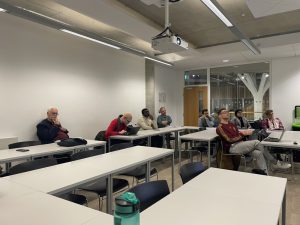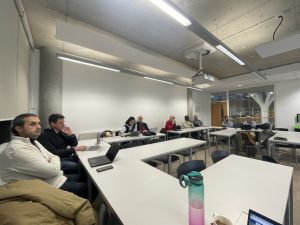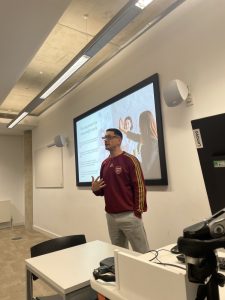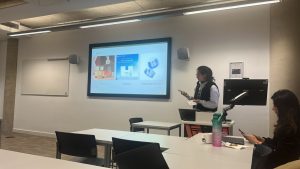In this month’s Research Connect seminar, organized by the Department of Marketing, Strategy, and Innovation in the Business School, we had the pleasure of hearing two captivating research presentations. Dr. Dayle Child explored the topic “Too Much of a Good Thing? The Double-Edged Sword of Meaningful Work,” highlighting the benefits and challenges of meaningful work among sales employees. Meanwhile, Shuyu Wan, preparing for her major review, shared her PhD progress on how brand attributes and consumer ethnocentrism/xenocentrism shape Chinese skincare purchase decisions.
The seminar was well-attended by colleagues and PGR’s and inspired engaging discussions on both topics. This was our final session for 2024. I’m truly grateful for the support and enthusiasm shown by colleagues in presenting, attending, and contributing to this seminar series. Their active participation has been instrumental in enriching our research culture across departments within the Business School.
Our Research Connect seminars will resume in 2025, with the first session scheduled for January 22nd, 4–5 PM in F306 with an opportunity to continue our research discussion in Dylan’s afterwards. If you have any questions or would like to participate in the 2025 seminar series, feel free to reach out to me at sashraf@bournemouth.ac.uk.
Wishing you a wonderful festive break and a happy New Year! See you in 2025.















 New CMWH paper on maternity care
New CMWH paper on maternity care From Sustainable Research to Sustainable Research Lives: Reflections from the SPROUT Network Event
From Sustainable Research to Sustainable Research Lives: Reflections from the SPROUT Network Event REF Code of Practice consultation is open!
REF Code of Practice consultation is open! ECR Funding Open Call: Research Culture & Community Grant – Apply now
ECR Funding Open Call: Research Culture & Community Grant – Apply now ECR Funding Open Call: Research Culture & Community Grant – Application Deadline Friday 12 December
ECR Funding Open Call: Research Culture & Community Grant – Application Deadline Friday 12 December MSCA Postdoctoral Fellowships 2025 Call
MSCA Postdoctoral Fellowships 2025 Call ERC Advanced Grant 2025 Webinar
ERC Advanced Grant 2025 Webinar Update on UKRO services
Update on UKRO services European research project exploring use of ‘virtual twins’ to better manage metabolic associated fatty liver disease
European research project exploring use of ‘virtual twins’ to better manage metabolic associated fatty liver disease